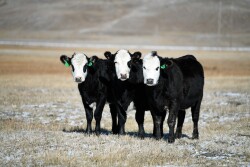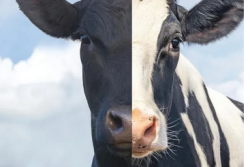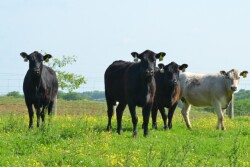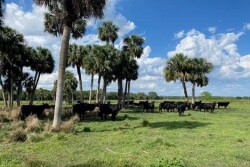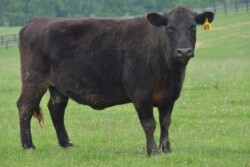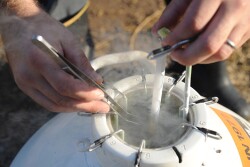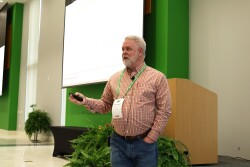Beef Genetics
Texas Tech’s Jennifer Koziol shares a comprehensive overview of strategic heifer development — focusing on selection, health, nutrition and breeding strategies.
Dr. Taylor Engle of Four Star Veterinary Services shares how producers can improve calf health outcomes by rethinking everything from pre-birth to bunk.
As dairy producers increasingly use beef semen to capitalize on calf value, longer gestation lengths are straining pre-fresh pens, pushing the industry to rethink cow flow, facilities, and future genetics.
Increasing carcass size, global methane research and beef on dairy were some of the key topics discussed during the 2025 BIF Symposium.
Angus Genetics Inc. white paper looks at the future expansion of data collection into the commercial sector.
It is estimated that cattle suffering from fescue toxicosis and heat stress alone cost the beef industry more than a billion dollars a year. University of Missouri demonstrates hair shedding is an economic relevant trait beyond the Southern U.S.
Strategies for evaluating herd performance following calving.
Cattle producers have been successful applying selection pressure to maintain calving ease while improving the additive genetic merit for weaning and yearling weight performance.
Beef producers have a significant influence on meat quality through breeding choices and nutrition management.
Researchers are using gene editing techniques to introduce beneficial traits like polled and disease resistance, as well as exploring innovative approaches like surrogate sires.
The beef cattle industry is evolving, and dairy producers are playing a pivotal role in that transformation.
Topics include genetic modifications in livestock, yield grades and a beef industry economic outlook.
One of the questions veterinarians are helping cow-calf producers answer is whether it’s a better decision to raise their own calves or buy them.
How this Iowa dairy boosts their bottom line with genomics and crossbreeding.
Needle size matters when using hormones during synchronization protocols for breeding cattle.
Have you wanted to have more calves born earlier in your calving season, but didn’t want to deal with the increase in labor, cost and facilities to utilize estrus synchronization and artificial insemination?
Annual five-state beef conference hosted by beef extension teams from Oklahoma, Kansas, Colorado, New Mexico, and Texas will be held Sept. 30 and Oct. 1.
When it comes to replacement females, it’s time to diversify selection methods beyond a subjective evaluation.
How balancing production cost control and efficiency can change your operation.
Reproduction is one of the most impacted traits by genetic x environment interactions. Body condition and metabolism are the other two most impacted traits. Research looks at the g x e decisions to make sure cattle reach their potential.
University of Missouri Extension addresses frequently asked questions about hair shedding and its importance for heat tolerance and as an economic trait.
The biggest impact of beef x dairy production is the blurring of the historical demarcation between beef and dairy sectors in the U.S.
With beef-on-dairy calf prices through the roof, making the right beef semen selection has the potential to push those sky-high prices even higher.
Beef “recip” cows are extremely expensive to purchase. Could renting dairy uteruses be an avenue for beef producers to explore?
Cost-share dollars in Tennessee and Kentucky have helped producers make genetic improvements to herds and increased producer education.
Gene editing is the use of modern molecular technology to precisely change the DNA sequence of an organism.

